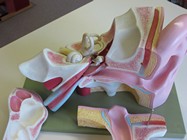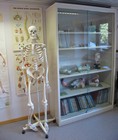[article]
| Titre : |
Troubles anxieux et alcoolisme : les liaisons dangereuses |
| Titre original : |
(Alcohol dependence and anxious disorders: dangerous liaisons) |
| Type de document : |
texte imprimé |
| Auteurs : |
P. Gorwood |
| Année de publication : |
2010 |
| Article en page(s) : |
801-806 |
| Langues : |
Français (fre) |
| Mots-clés : |
ALCOHOL ALCOOL DRUG DEPENDENCE DEPENDANCE ANXIETY ANXIETE COMORBIDITY COMORBIDITE RISK FACTOR FACTEUR DE RISQUE TREATMENT TRAITEMENT |
| Résumé : |
FRANÇAIS :
Les troubles anxieux (anxiété généralisée, trouble panique, phobie sociale, agoraphobie ou phobie spécifique, syndrome de stress post-traumatique) ont une forte comorbidité avec l'alcoolo-dépendance. L'origine de cette co-occurrence est double puisque la présence d'un trouble anxieux multiplie le risque d'apparition d'une alcoolo-dépendance par 3, et la présence d'une alcoolo-dépendance multiplie par 6 le risque d'émergence d'un trouble anxieux. Une étude récente, réalisée en population générale, a permis de préciser que l'existence d'un trouble anxieux augmente surtout le risque de passage de l'abus à la dépendance (de 70 %). La distinction entre les symptômes du trouble anxieux et du sevrage alcoolique n'est parfois pas chose facile. L'entretien doit alors se focaliser sur certains symptômes plus spécifiques tels que nausées, vomissements et tremblements, et ce d'autant qu'ils régressent à la prise d'alcool. Le traitement des troubles anxieux débute par un sevrage d'alcool, que le trouble anxieux soit primaire ou secondaire. En effet, les antidépresseurs (qui possèdent un effet anxiolytique démontré) sont potentiellement hépatotoxiques, ce qui est « gênant » chez les sujets alcoolo-dépendants. De plus, la prescription de benzodiazépines de longue durée chez les sujets consommateurs de fortes doses d'alcool a le désavantage d'augmenter (franchement) le risque de complication grave de sevrage, essentiellement pour l'épilepsie. [Résumé d'auteur]
ENGLISH:
Anxiety disorders and alcohol dependence have a higher co-occurence than expected by chance only. This association has a double origin, as the presence of alcohol dependence increases by 6 the risk of any anxious disorder, and the presence of an anxious disorder multiply by 3 the risk of alcohol-dependence. Interestingly, a large population-based epidemiological study performed 10 years apart clearly showed that anxiety disorders moderatly increase the risk of regular consumption in non-consumers or irregular drinkers (by 70%), does not increase the risk of abuse in regular drinkers, but has a strong impact on the risk of alcohol dependence while already an abuser (OR = 2.7). Assessing the kinetic of symptoms of anxiety and focusing on some symptoms that are more specific than others (for example nausea, vomiting and/or shaking hands in the morning, all being relieved by the first drink) is helpful. Treating anxiety symptoms in alcohol dependence means, whatever the type of relationship they have, to begin with a detoxification program. Indeed, antidepresants have a larger liver-toxicity in alcohol dependence, and benzodiazepine loose most of their benefits with high level of alcohol consumption. Furthermore, when benzodiazepines are taken with large doses of alcohol, the risk of severe withdrawal symptoms is increased (such as seizures). The same trend could be proposed for psychotherapy, as cognitive behavioural therapy sollicitates a lot executive functions. The neurotoxicity of alcohol explains the damages on executive functions, CBT therefore should have larger efficacy after the detoxification program, helping to reduce the risk of relapse. [Author's abstract] |
| Permalink : |
http://cdocs.helha.be/pmbgilly/opac_css/index.php?lvl=notice_display&id=25982 |
in La revue du praticien > Tome 60, n°6 (20 juin 2010) . - 801-806
[article] Troubles anxieux et alcoolisme : les liaisons dangereuses = (Alcohol dependence and anxious disorders: dangerous liaisons) [texte imprimé] / P. Gorwood . - 2010 . - 801-806. Langues : Français ( fre) in La revue du praticien > Tome 60, n°6 (20 juin 2010) . - 801-806
| Mots-clés : |
ALCOHOL ALCOOL DRUG DEPENDENCE DEPENDANCE ANXIETY ANXIETE COMORBIDITY COMORBIDITE RISK FACTOR FACTEUR DE RISQUE TREATMENT TRAITEMENT |
| Résumé : |
FRANÇAIS :
Les troubles anxieux (anxiété généralisée, trouble panique, phobie sociale, agoraphobie ou phobie spécifique, syndrome de stress post-traumatique) ont une forte comorbidité avec l'alcoolo-dépendance. L'origine de cette co-occurrence est double puisque la présence d'un trouble anxieux multiplie le risque d'apparition d'une alcoolo-dépendance par 3, et la présence d'une alcoolo-dépendance multiplie par 6 le risque d'émergence d'un trouble anxieux. Une étude récente, réalisée en population générale, a permis de préciser que l'existence d'un trouble anxieux augmente surtout le risque de passage de l'abus à la dépendance (de 70 %). La distinction entre les symptômes du trouble anxieux et du sevrage alcoolique n'est parfois pas chose facile. L'entretien doit alors se focaliser sur certains symptômes plus spécifiques tels que nausées, vomissements et tremblements, et ce d'autant qu'ils régressent à la prise d'alcool. Le traitement des troubles anxieux débute par un sevrage d'alcool, que le trouble anxieux soit primaire ou secondaire. En effet, les antidépresseurs (qui possèdent un effet anxiolytique démontré) sont potentiellement hépatotoxiques, ce qui est « gênant » chez les sujets alcoolo-dépendants. De plus, la prescription de benzodiazépines de longue durée chez les sujets consommateurs de fortes doses d'alcool a le désavantage d'augmenter (franchement) le risque de complication grave de sevrage, essentiellement pour l'épilepsie. [Résumé d'auteur]
ENGLISH:
Anxiety disorders and alcohol dependence have a higher co-occurence than expected by chance only. This association has a double origin, as the presence of alcohol dependence increases by 6 the risk of any anxious disorder, and the presence of an anxious disorder multiply by 3 the risk of alcohol-dependence. Interestingly, a large population-based epidemiological study performed 10 years apart clearly showed that anxiety disorders moderatly increase the risk of regular consumption in non-consumers or irregular drinkers (by 70%), does not increase the risk of abuse in regular drinkers, but has a strong impact on the risk of alcohol dependence while already an abuser (OR = 2.7). Assessing the kinetic of symptoms of anxiety and focusing on some symptoms that are more specific than others (for example nausea, vomiting and/or shaking hands in the morning, all being relieved by the first drink) is helpful. Treating anxiety symptoms in alcohol dependence means, whatever the type of relationship they have, to begin with a detoxification program. Indeed, antidepresants have a larger liver-toxicity in alcohol dependence, and benzodiazepine loose most of their benefits with high level of alcohol consumption. Furthermore, when benzodiazepines are taken with large doses of alcohol, the risk of severe withdrawal symptoms is increased (such as seizures). The same trend could be proposed for psychotherapy, as cognitive behavioural therapy sollicitates a lot executive functions. The neurotoxicity of alcohol explains the damages on executive functions, CBT therefore should have larger efficacy after the detoxification program, helping to reduce the risk of relapse. [Author's abstract] |
| Permalink : |
http://cdocs.helha.be/pmbgilly/opac_css/index.php?lvl=notice_display&id=25982 |
|  |


 Ajouter le résultat dans votre panier Faire une suggestion Affiner la recherche
Ajouter le résultat dans votre panier Faire une suggestion Affiner la rechercheCe qui a changé dans la prise en charge de la schizophrénie / Y. Le Strat in Le Concours Médical, 1 (2005)
Ce qui a changé dans la prise en charge de la schizophrénie / Y. Le Strat in Le Concours Médical, 1 (2005)
Troubles anxieux et alcoolisme : les liaisons dangereuses / P. Gorwood in La revue du praticien, Tome 60, n°6 (20 juin 2010)










